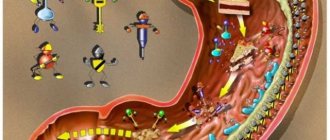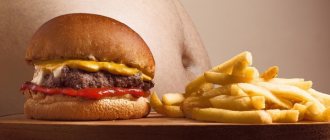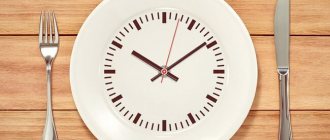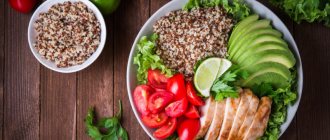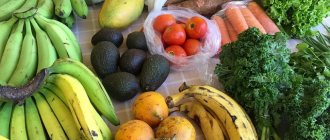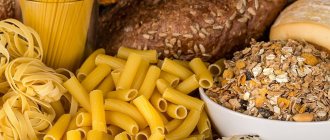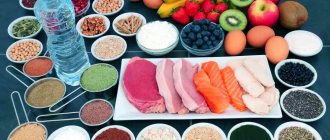What is fasting
Fasting is the voluntary refusal of food. It may have medicinal purposes. But the most common reason for refusing food is the desire to lose weight, especially in the case of women.
Let's look at the benefits that hunger can bring:
- Cleansing the body. Fasting is necessary for food poisoning, as well as during the treatment of certain intestinal and liver diseases. In addition, fasting helps with exacerbation of allergies.
- Weight loss due to lack of carbohydrates and fats.
- Normalization of cholesterol and glucose levels in the blood.
It is believed that periodic one-day fasts prolong life expectancy and youth, and improve well-being. However, it is important to remember that before each refusal to eat, you should consult a doctor and undergo the necessary tests. Otherwise, you risk harming your body.
Helps control blood sugar by reducing insulin resistance
Several studies have found that fasting can improve blood sugar control, which may be especially beneficial for people at risk of developing diabetes.
In fact, one study of 10 people with type 2 diabetes found that short-term intermittent fasting significantly lowered blood sugar levels ().
Meanwhile, another review found that both intermittent fasting and alternate-day fasting were as effective in reducing insulin resistance as calorie restriction ().
Reducing insulin resistance can improve your body's sensitivity to insulin, allowing it to move glucose from your blood into your cells more efficiently.
Combined with the potential blood sugar-lowering effects of fasting, this practice may also help maintain stable blood sugar levels, preventing spikes and dips in blood sugar levels.
Keep in mind that some studies have shown that fasting may affect the blood sugar levels of men and women differently.
For example, one small three-week study found that among alternate-day fasters, the practice impaired blood sugar control in women but had no effect in men ().
Summary:
Intermittent fasting and alternate-day fasting can help lower blood sugar and reduce insulin resistance, but may affect men and women differently.
Contraindications to fasting
Refusal to eat may be contraindicated in patients suffering from:
- oncological diseases;
- tuberculosis;
- heart failure;
- diseases of the liver and genitourinary system.
Fasting is also contraindicated in patients who have recently suffered a serious illness or organ transplant. It is forbidden for people suffering from type I diabetes to fast: this can lead to death in a short time.
Pregnant women and nursing mothers who are trying to lose excess weight after childbirth should not refuse food.
Fasting: what happens in the body
In a fasting person, the level of hemoglobin in the blood decreases. This leads to a decrease in the number of red blood cells responsible for transporting oxygen. As a result, internal organs, in particular the brain, begin to experience an acute lack of oxygen.
Due to lack of nutrients, a person feels apathy and weakness. Concentration decreases and sleep is disturbed. Fasting can be accompanied by fainting and nervous breakdowns. In severe cases, anemia develops.
What does fasting lead to: consequences
Possible consequences of not eating include:
- Intestinal dysfunction. Due to lack of food, the intestines gradually lose their functions. Having returned to their usual diet, a person often faces constipation, leading to hemorrhoids.
- Slowing down metabolic processes. After a hunger strike, our body tries to compensate for the lack of nutrients as quickly as possible; a person begins to uncontrollably eat food in huge quantities. And since our metabolism slows down during fasting, we instantly gain weight. Often body weight becomes even greater than before fasting.
- Hormonal imbalance. Fasting can cause miscarriage during pregnancy. A woman who has fasted for a long time sometimes loses her ability to conceive forever.
- Dehydration. A person receives fluid not only through drinks, but also through food. Accordingly, a fasting person requires more fluid. Particularly dangerous is dry fasting, during which one even refuses water. Lack of fluid in the body can lead to death within a few days.
- Development of anorexia. This is a serious eating disorder in which the body completely rejects food. People suffering from anorexia often experience a gag reflex after eating.
- Disruption of the functioning of some internal organs. The cardiovascular system and brain are most often affected.
How to prepare for a fasting diet
Algorithms are not suitable here. Prepare for fasting days a week in advance. Just a psychological attitude is not enough; limit your intake of fatty protein foods, replacing them with dairy-vegetable foods. Choose a fasting day when you do not have physical work. It's better if it's a day off.
Maintain drinking regime. Nutritionists advise drinking 2.5 liters of liquid on a fasting day. Not ordinary water, but alkaline mineral water, for example, “Borjomi” at room temperature. Leave the bottle open to allow gas bubbles to escape.
When you are hungry, do not spare yourself by collapsing on the sofa - leisurely walks in the forest, park, near bodies of water are necessary. You will receive endorphins - “hormones of joy”, not by eating food, but by contemplating beauty - “replacement” therapy occurs. In this mood, fasting gives you less discomfort and mobilizes the body's defenses.
How to break a hunger strike correctly
Fasting (especially long-term) radically changes the normal functioning of the human body and slows down metabolic processes. For this reason, it is not recommended to suddenly return to your previous diet.
If a person has been forced to give up food and water for a long time, then returning to their usual diet should take place in several stages:
- During the first week after breaking the fast, you can only drink still water. By the end of the week, it is allowed to switch to juices, and also gradually introduce liquid foods into the diet (ex: broths, mashed potatoes diluted with milk). The serving should not exceed 50-100 g.
- In the second week, salads and cereals are introduced into the diet. The portion can be increased, but not more than 50 g.
- During the third week, the menu includes foods that the patient ate before fasting. At the same time, the consumption of baked goods, fried, pickled and smoked foods, spices and alcohol is prohibited.
- Only in the fourth or fifth week can the patient begin to eat as usual.
Fasting allows you to experience the taste of food more vividly
Food is a source of pleasure, as nature intended. When we eat food that we like, it triggers the release of dopamine. During fasting, the body does not receive this same dopamine, what happens? What happens is that the dopamine receptors become more sensitive, and then when we start eating again, we feel more pleasure from those foods that had become completely ordinary before the fast.
The typical principle of increasing the body's tolerance works here. Any pleasure we experience is a release of dopamine. For example, why do drug addicts have to constantly increase their dose? The fact is that the body developed tolerance to yesterday’s dose, in other words, it began to release less dopamine. And in order to get the same pleasure today as yesterday, a person is forced to increase the dose.
Much has already been said about the fact that food is, in a sense, a drug, and in this case this statement could not be more relevant, because the principle of getting pleasure from food is the same. You can easily see this for yourself. If you eat your favorite dish every day, in a month you will eat it like grass - without any emotions, and in another month you will hate it. On the contrary, if you refrain from eating your favorite dish for some time, then the feeling of pleasure will be much brighter. Because the body has become unaccustomed to this dish and, with its new appearance in the diet, reacts to this with a much greater release of dopamine.
Based on this, fasting can also help reduce the amount of food consumed. As mentioned above, when the body develops tolerance to one or another type of pleasure, it is necessary to constantly increase the dose so that this pleasure becomes bright and rich again. But this is a road to nowhere. In the context of nutrition, this leads to overeating, and the volume will grow exponentially.
And fasting can solve the problem. After fasting, your normal diet will give you a lot of vivid emotions and sensations, and you will feel it yourself. Moreover, you will begin to experience joy from simple, ordinary plant foods. And perhaps this will allow you to give up junk food.
How can you replace food refusal?
If a woman is ready to go on a fast to lose weight, then she should reconsider her decision in favor of more gentle methods:
- Exercise stress. Sports activities are recommended for people forced to lead a sedentary lifestyle. Doing exercises for 10 minutes twice a day is no less effective way to lose weight than heavy physical activity for 1.5-2 hours 2 times a week.
- Switching to proper nutrition for women. You should avoid eating foods that increase body weight (baked goods, sweets, etc.). Since it is very difficult to immediately eliminate junk food from your diet, it is recommended to do it gradually. It is best to eat in small portions (200-300 g at a time) 5-6 times a day.
Weight gain can be caused by various diseases. In this case, all of the listed methods of combating excess weight will be ineffective. If excess kilograms appear for no apparent reason, you should consult an endocrinologist.
Thus, prolonged fasting in the absence of medical indications can cause irreparable harm to our body. Refusal of food slows down metabolism, disrupts the functioning of internal organs and increases the risk of developing diseases. It is not at all necessary to make such sacrifices for the sake of a beautiful slim figure - you just need to give up high-calorie foods and switch to proper nutrition with the SECRETFIT healthy food delivery service!
Menu and products for intermittent fasting
As we wrote earlier, intermittent fasting requires a lot of protein, especially for those who play sports. Nutrition should be balanced, which means it should also include fats and carbohydrates.
On sports days, you can eat nuts, avocados, flax seeds, cold-pressed oils, wholemeal bread, cereals, legumes and high-fiber vegetables such as carrots and cabbage.
On rest days, eat foods that contain fewer carbohydrates; give preference to brown rice as side dishes. Consume more fruits and vegetables.

